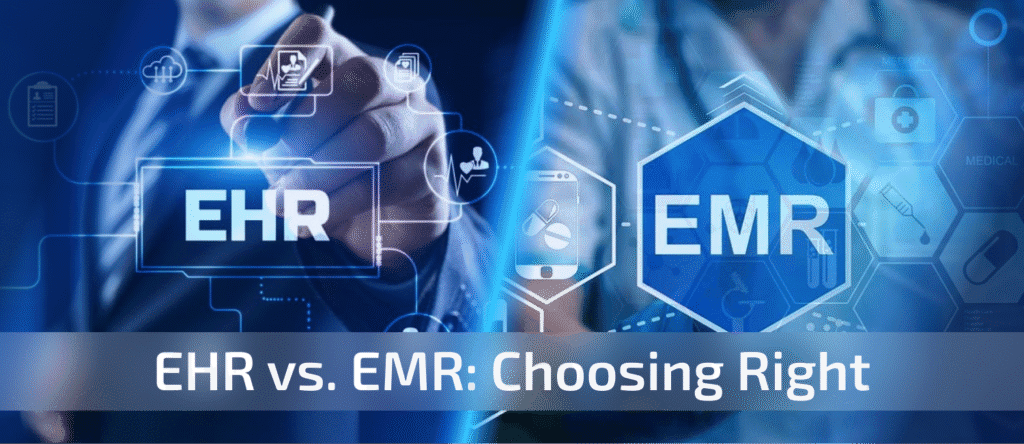The healthcare industry has undergone a massive digital transformation over the last decade. At the beginning of this shift there are Electronic Medical Records (EMR) and Electronic Health Records (EHR)two terms often used interchangeably but with important differences. Choosing the right system is critical for patient care, compliance, and practice efficiency.
So, what’s the difference, and which one should your practice adopt? Let’s break it down.
An Electronic Medical Record (EMR) is a digital version of a patient’s chart within a single practice. It contains:
- Patient medical history
- Diagnoses and treatment notes
- Lab results and imaging reports
EMRs are primarily designed for internal use by one healthcare provider or practice. They replace paper charts but typically don’t share data easily outside the organization.
Best for: Small practices needing a digital record system without complex interoperability requirements.
An Electronic Health Record (EHR) is a more comprehensive system. It not only stores patient records but also allows information sharing across multiple providers, hospitals, and even states. EHRs support:
- Real-time data sharing across care teams
- Patient portals for engagement
- Integration with labs, pharmacies, and billing systems
- Compliance with healthcare regulations (e.g., HIPAA, interoperability rules)
Best for: Practices seeking growth, collaboration, and long-term digital transformation.
| Feature | EMR | EHR |
| Scope | Single practice use | Multi-provider, multi-organization |
| Data Sharing | Limited | Seamless interoperability |
| Patient Access | Rare | Patient portals & apps |
| Compliance | Basic | Fully compliant with national standards |
| Scalability | Limited | Highly scalable & future-proof |
How to Decide What’s Right for Your Practice
- Practice Size & Future – Smaller clinics may start with EMRs, but growing practices benefit more from EHRs.
- Collaboration Needs – If you need to share patient records with other providers, EHR is the better choice.
- Budget & Resources – EMRs are generally more affordable, but EHRs deliver higher long-term ROI through efficiency.
- Regulatory Requirements – EHRs make it easier to comply with interoperability mandates and reporting standards.
The Role of IT Partners in Your Decision
Choosing between EMR and EHR is not just about features, it’s about strategy. That’s where PointofIT comes in. We help healthcare organizations assess needs, implement the right system, integrate it with existing workflows, and ensure security and compliance.
Both EMRs and EHRs improve clinical efficiency compared to paper records. However, EHRs provide a future-ready solution with interoperability, scalability, and patient engagement at the core.
For healthcare practices looking to grow, collaborate, and innovate, EHRs are the clear choice. With the right IT partner, you can implement a system that supports better care delivery and long-term success.
Ready to choose the right digital health solution? Contact PointofIT today and let’s build your future of care.
